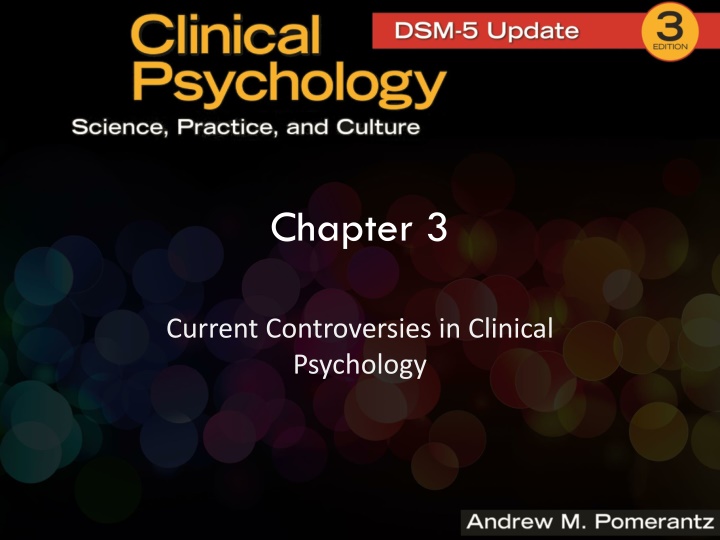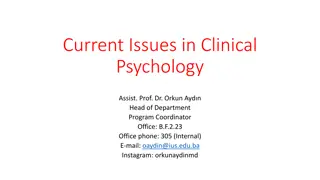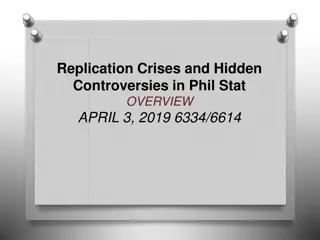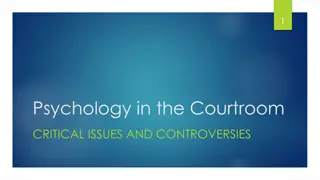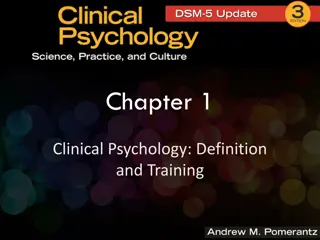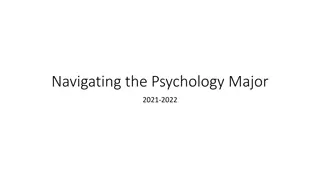Current Controversies in Clinical Psychology
This chapter delves into current controversies in clinical psychology, including the debate on prescription privileges for psychologists, evidence-based practice, overexpansion of mental disorders, and payment methods. It discusses the advantages and disadvantages of psychologists prescribing medication, the importance of evidence-based therapy, and key issues shaping the field.
Download Presentation

Please find below an Image/Link to download the presentation.
The content on the website is provided AS IS for your information and personal use only. It may not be sold, licensed, or shared on other websites without obtaining consent from the author.If you encounter any issues during the download, it is possible that the publisher has removed the file from their server.
You are allowed to download the files provided on this website for personal or commercial use, subject to the condition that they are used lawfully. All files are the property of their respective owners.
The content on the website is provided AS IS for your information and personal use only. It may not be sold, licensed, or shared on other websites without obtaining consent from the author.
E N D
Presentation Transcript
Chapter 3 Current Controversies in Clinical Psychology
Current Controversies Overview Prescription Privileges Evidence-Based Practice/Manualized Therapy Overexpansion of Mental Disorders Payment Methods: Third-Party Payment vs. Self-Payment The Influence of Technology and Cybertherapy
Prescription Privileges Historically, prescribing has distinguished psychiatrists from psychologists However, in recent decades, clinical psychologists have actively pursued prescription privileges
Prescription Privileges Since 2002, two states have agreed to grant prescription privileges to appropriately trained psychologists New Mexico Louisiana Other states have considered similar legislation, and may pass it soon
Prescription Privileges Why psychologists should prescribe: Shortage of psychiatrists Especially in rural areas Important factor in NM and LA decisions CPs more expert than primary care docs Other non-physicians have privileges Dentists, podiatrists, optometrists, and some nurses, among others Convenience for clients
Prescription Privileges Why psychologists should prescribe (continued): Professional autonomy Professional identification Evolution of the profession Revenue for the profession
Prescription Privileges Why psychologists should not prescribe: Training issues Which courses? When? Taught by whom? Threats to psychotherapy Would medications replace talk therapy? Identity confusion Especially when only some prescribe Influence of pharmaceutical industry
Evidence-Based Practice/ Manualized Therapy When researchers measure therapy outcome, they often use therapy manuals To ensure uniformity across therapists To minimize variability When outcome data supports the use of a manualized therapy, the treatment is known as evidence based Treatments formerly called empirically validated and empirically supported Evidence-based practice includes the treatment and factors related to people providing and receiving the treatment
Advantages of Evidence-Based Practice/Manualized Therapy Scientific legitimacy Establishing minimal levels of competence Training Improvements Decreased reliance on clinical judgment
Disadvantages of Evidence-Based Practice/Manualized Therapy Threats to the psychotherapy relationship Diagnostic complications Textbook cases vs. real world cases Restrictions on practice Mandated manuals vs. creatively customized treatments Debatable criteria for empirical evidence
Overexpansion of Mental Disorders DSM size and scope has increased from 1950s to present Overdiagnosis, diagnostic expansion, diagnostic inflation, diagnostic creep, medicalization of everyday problems, false positives, false epidemics? Minimizing the chance that people struggling with mental illness fall through the cracks vs. overdiagnosis of normal life experiences If diagnoses continue to expand, can anyone be diagnosed with a mental disorder?
New Disorders, New Definitions Disorders Premenstrual dysphoric disorder Severe versions of the symptoms of premenstrual syndrome Binge eating disorder Out-of-control overeating at least once per week Definitions ADHD Age by which symptoms appear raised from 7 to 12
Risks of Overdiagnosis Unnecessary medication harmful side effects Unnecessary therapy undermine coping skills Negatively impact self-image and self-efficacy via stigma Adversely affect health insurance enrollment and rates Legal ramifications
Overdiagnosis and the Pharmaceutical Industry More mental disorders = more potential pharmaceutical customers? Significant numbers of psychiatrists involved in the creation of the DSM had financial ties to major pharmaceutical companies 69% for DSM-5
Payment Methods: Third-Party Payment vs. Self-Payment Early in the history of clinical psychology, clients paid for services directly out of pocket With time, health insurance companies began covering mental health Today, many clients use health insurance/managed care benefits to pay for services Often called third-party payers
Effect of Third-Party Payment on Therapy Surveys of psychologists suggest that third- party payment can result in Negative impact on quality Too little control over clinical decisions Ethical problems, including confidentiality Confusion about informed consent (what to tell clients about payment method) Greater affordability for many clients
Effect of Third-Party Payment on Diagnosis Surveys of psychologists suggest that third- party payment can result in Increased likelihood of being diagnosed with a mental disorder Certain diagnostic categories being used more or less often
Effect of Third-Party Payment on Psychologists Experience Lower pay Time required for paperwork, phone calls, etc. Frustration due to denial of care psychologist believes to be necessary
The Influence of Technology: Cybertherapy and More In recent years, clinical psychologists have increasingly used technology in the direct delivery of psychological services Assessment Treatment Cybertherapy can replace or supplement face-to-face meetings Benefits can include accessibility, affordability, and anonymity, and more
Applications of Technology in Clinical Psychology: Examples Videoconferencing to interview or treat Email or text psychotherapy Interactive Internet sites Online psychotherapy programs Virtual reality therapeutic experiences Computer-based self-instruction Therapist/client interaction via hand-held devices (e.g., iPhones, cell phones, Blackberries)
How Well Does Cybertherapy Work? Appears to work about as well as in-person psychotherapy Specific examples include CBT for anxiety disorders Health psychology Headaches Pain
Technology: Suggestions for Emerging Professional Issues Obtain informed consent about the technology Follow relevant telehealth laws Follow APA ethical code Ensure confidentiality via encryption Make efforts to appreciate culture Obtain relevant training Know client s local emergency resources
Technology: Additional Potential Problems Confirming the identity of the client Confidentiality across electronic transmission Making interpretations in the absence of nonverbal cues that would be present face-to- face Competence in technical as well as clinical skills
Technology: Effectiveness of Treatment Early research is beginning to demonstrate that it can work Success depends on many factors: Which cybertherapy, disorder, device? What setting? How clients found or were referred to cybertherapy? Live support available?
